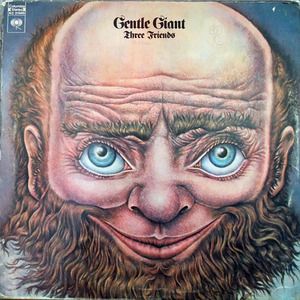Far East Family Band - Nipponjin (Vertigo DE | Late 1975)
Led by Fumio Miyashita and Kei Ishikawa Far Out was one of the original Japanese psychedelic bands. They released one album of lo-fi psychedelic rock, Far Out, in 1973. Miyashta then recruited a new lineup as Far East Family Band, including two keyboardists: Akira Itoh and Masanori Takahashi, the latter more famously known as Kitaro. Nipponjin, which carried the subtitle, "Join Our Mental Phase Sound," was mostly a re-recording of their "The Cave" Down To The Earth album, but with English lyrics and Klaus Schulze hired for the remix. "Nipponjin" opens the first side with bubbly synthesizers and sitar. Miyashita's guitar and voice are upfront, and his tentative hold of the English language lends some charm; the track was first heard on the Far Out album but in guitar form. "The Cave" reveals a strong Pink Floyd influence and plenty of dynamics. The tracks on the second side run together, drifting in and out of the mix; but when they're in, it's mostly heavy psychedelic rock, while the quieter moments are either awash with Mellotron or silence. The closing "Mystery of Northern Space" rises to a symphonic finale. Though dated, this is venerable space rock, with a strong reflective or even hippie vibe—the precursor to Acid Mothers Temple, anyone? The album saw release on the Vertigo label in Germany and on Mu Land in Japan the following year. The band's next album, Parallel World, was recorded directly under the hands of Schulze and guitarist Günter Schickert at Virgin's The Manor Studio; as such, it should have been the more successful of the two albums, but unfortunately at the cost of much of their originality—especially on the long title track. Oddly, both Vertigo and Virgin turned the album down, and it only saw release in Japan. Both Kitaro and Itoh then split for successful solo careers with new age music. Miyashta, bassist Akira Fukakusa and guitarist Hirohito Fukushima recruited a new drummer and recorded the band's final album, Tenkujin, for the US label All Ears Records. Far Out's Ishikawa would form Chronicle in the mid-70s in Los Angeles, also releasing one album, ...Like A Message From The Stars, for All Ears Records in 1977. Miyashta eventually turned to a prolific career in electronic therapy music.











































